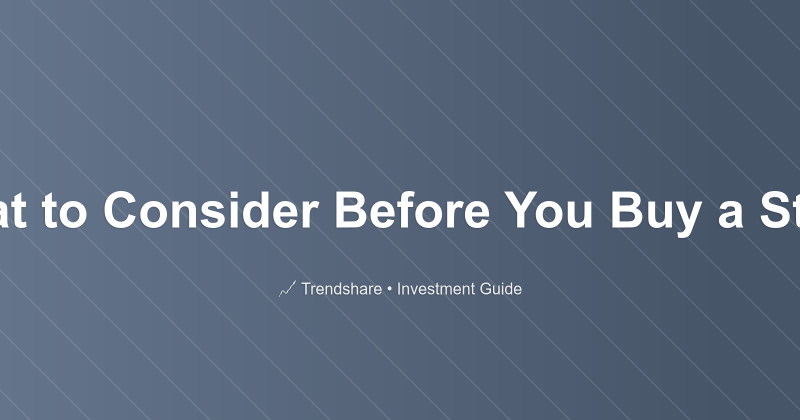
What to Consider Before You Buy a Stock
By Ethan Mercer
Financial Technology Analyst • 10+ years in fintech and payments
Before you buy any stock research the company. Consider the business behind it. Do you know its story? Can it grow as you expect it to?
You've found a stock with a great history of real earnings growth—and it's on sale! You're ready to click your mouse to buy some shares. Everything's great, right? You're all set, right?
Hang on! Before you buy, make sure you know your stock's story (as also explained in One Up on Wall Street)! How do you do that? Great question!
Value Investors Tell Stories about Value?
Value investors can get a lot of mileage out of analysis such as free cash flow analysis and discounted cash flow. You can find great bargains in the stock market if you look.
Yet every projection rests on two assumptions:
- First, great companies make money and grow predictably
- Second, an over- or undervalued stock price will eventually correct to the true underlying value of the company
Over time, these assumptions hold up pretty well.
Though all of this may sound complicated, an hour of research or less can help you answer "is this a good stock to buy right now?" for most of the stocks out there, especially if you've narrowed down your choices to three or four good possibilities. In an afternoon you can decide what you really should buy. Here's where your story lines come in.
What's a Stock's Story?
The stock's story is simple. You have to answer one question. How will the company make more money?
To answer that, you have to learn a few things about the company's business. What does it sell? Who are its customers? How often do they buy? How much work is it to get new customers or to keep existing customers?
What's the market for the product or service? Is that market growing or shrinking? Are there similar markets to enter or leave?
How much competition does the company have? Is it easy for competitors to enter the marketplace? What advantage does the company have over competition? (A brand name, expensive factory, important people or inventions that are difficult to reproduce, prime real estate.)
How much further can the company grow? How much does it cost to expand? A small company can double in size much more easily and quickly than a huge company; that's why stocks like Facebook have limited growth potential compared to plucky little startups.
Are there any obstacles in the way of growth? (Regulatory issues, management scandals, risky ventures.)
Who manages the business? How long have they been there? What's their background? Where were they before? What's their philosophy?
What's the business done for its owners in the past? You can learn a lot by looking at the track record of paying dividends or buying back stock.
When Should You Buy a Stock?
If you've done your homework and found a storyline to explain how the company will produce real value, your last task is to determine whether your story is plausible. Can the company really meet your expectations over the next five or ten years? What could go wrong? What has to go right? You don't have to predict the future in complete detail, but your story needs to hold together.
If at any point you start seeing red flags and think "Wow, this is starting to seem unlikely", stop and move on. You're the only person you have to convince. If you don't understand the strategy and plan and if you're not comfortable with it, don't invest. There will be other stocks. There are always good opportunities for the patient.
The story doesn't have to give you complete confidence that the company will do exactly as you expect, right down to the penny. Stocks go up. Stocks go down. In the short term anything can happen—but you want to buy into a good business with great potential.
After all, you're buying part of a business. You want a business you understand, a business that can grow, and a business that will make real money. Those are the stocks to buy.
Investment Disclaimer
This article is for educational purposes only and does not constitute investment advice. Stock prices, financial metrics, and market conditions change constantly. Company examples are provided for illustration and should not be considered recommendations. Always verify current data from official sources such as company investor relations pages or SEC filings, assess your own risk tolerance and investment objectives, and consult a qualified financial advisor before making investment decisions. Past performance does not guarantee future results.